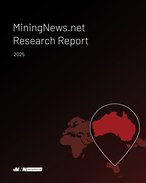This article is 10 years old. Images might not display.
The roundtable will also share knowledge, information and advise governments on decision making around balancing their energy mixes.
The roundtable, chaired by Wesfarmers managing director and COAL 21 chair Stewart Butel, will include senior representatives from the coal, oil and gas and power generation industries, research organisations, federal and state governments and the Global CCS (carbon capture and storage) Institute.
COAL21 is the fund established by Australia's coal industry to support the research, development and deployment of low-emissions coal technologies.
The roundtable also includes leaders from CO2CRC, Inpex, EnergyAustralia, the Energy Supply Association of Australia, CSIRO, the federal Department of Industry, Western Australia's Department of Mines and Petroleum, and the Australian Petroleum Production and Exploration Association.
Rick Fowler, the program director of NSW Trade and Investment Energy and Resources Division's coal innovation department, is also on the roundtable, as is Sandra Denis of Victoria's Energy and Earth Resources department, and Global CCS Institute CEO Brad Page.
With many clean technologies already in development, the Minerals Council of Australia, which was driving the initiative, said it's not about contributing to the renewables versus fossil fuels debate, but acknowledging that the world's energy needs are only increasing. This makes promoting and sharing knowledge on clean technologies for fossil fuels all the more important.
"Fossil fuels will continue to make an indispensable contribution to the world's energy, plastics, chemicals, steel, cement, glass, aluminium and fertiliser industries and to a wide range of industrial products, including textiles, paints and dyes. The use of fossil fuels and lower carbon emissions are not mutually exclusive," MCA CEO Brendan Pearson said.
"The Roundtable's role will be to share information on relevant low emission technology activities across Australia and overseas and to identify potential new studies and activities that could address current gaps and future needs.
"These may include technologies for high efficiency/lower emission generation, fugitive emission abatement and CCS.
"The forum will also promote wider understanding of the role and importance of large scale demonstration of low emissions technologies for fossil fuels and their benefits to society. Its advice will be an important input into the development of relevant federal and state government policies."
A coordinated effort by industry and governments has seen 22 large-scale enhanced oil recovery carbon capture or CCS projects come into operation or construction around the world over the last decade.
The world's first large-scale power plant to capture and store carbon dioxide opens this week at SaskPower's Boundary Dam in Canada, which is estimated to capture one million tonnes of carbon dioxide each year with any carbon dioxide not used in EOR to be stored in a deep saline formation.
The Roundtable will build on activities already underway in Australia, including CO2CRC's Otway carbon dioxide storage project in Victoria, the Queensland Callide Oxyfuel power project and the Chevron-operated Gorgon joint venture's investment in the world's largest commercial-scale carbon dioxide injection facility, currently under construction in Western Australia.
Australia has also undertaken a national assessment of the nation's greenhouse gas storage capacity and was the first country to introduce legislation to govern both onshore and offshore geological sequestration.
CO2CRC CEO Dr Richard Aldous said it was in Australia's and the world's best interests to adopt a pragmatic and coordinated approach across industries, especially considering it is one of the highest emitters of carbon dioxide per capita in the developed world.
"Australia's response to climate change must embrace and advance technologies that limit, or prevent, carbon emissions from fossil fuel use," he said.
He was particularly pleased about the MCA's roundtable initiative that unites industry and government, particularly during the current period of policy uncertainty and budgetary constraints.























